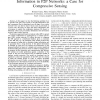Free Online Productivity Tools
i2Speak
i2Symbol
i2OCR
iTex2Img
iWeb2Print
iWeb2Shot
i2Type
iPdf2Split
iPdf2Merge
i2Bopomofo
i2Arabic
i2Style
i2Image
i2PDF
iLatex2Rtf
Sci2ools
142
click to vote
P2P
2010
IEEE
2010
IEEE
Local Access to Sparse and Large Global Information in P2P Networks: A Case for Compressive Sensing
—In this paper we face the following problem: how to provide each peer local access to the full information (not just a summary) that is distributed over all edges of an overlay network? How can this be done if local access is performed at a given rate? We focus on large and sparse information and we propose to exploit the compressive sensing (CS) theory to efficiently collect and pro-actively disseminate this information across a large overlay network. We devise an approach based on random walks (RW) to spread CS random combinations to participants in a random peer-topeer (P2P) overlay network. CS allows the peer to compress the RW payload in a distributed fashion: given a constraint on the RW size, e.g., the maximum UDP packet payload size, this amounts to being able to distribute larger information and to guarantee that a large fraction of the global information is obtained by each peer. We analyze the performance of the proposed method by means of a simple (yet accurate) analyti...
| Added | 29 Jan 2011 |
| Updated | 29 Jan 2011 |
| Type | Journal |
| Year | 2010 |
| Where | P2P |
| Authors | Rossano Gaeta, Marco Grangetto, Matteo Sereno |
Comments (0)

